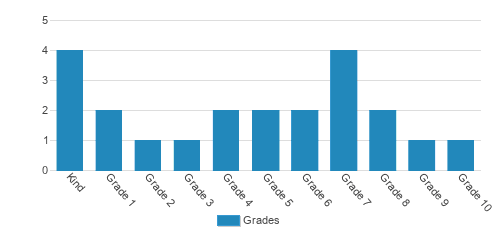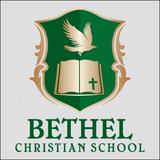Calvary Christian Academy is non-denominational K-12 Christian school dedicated to providing a high-quality, academic program built upon a Biblical foundation.
We offer multiage classes with a combination of individualized, self-paced courses and whole class instruction.
We teach the Bible in every grade, along with traditional mathematics, classic literature, real history, science that actually enhaces your child's faith, and foreign language through Rosetta Stone.
Extracurricular classes in art, music, cooking, and vocational skills are offered along with after school activities, including chess and board game clubs, book clubs, Lego club, and golf club.
Homeschooling students are welcome to enroll part time, to register for single classes, or participate in after school activities.
School Overview
Student Body
Total Students
22 students
Student Body Type
Co-ed
Students by Grade

Academics and Faculty
Total Classroom Teachers
4 teachers
Student : Teacher Ratio
6:1
National avg.: 13:1
Average Class Size
5 students
Tuition and Acceptance Rate
Admission Deadline
None / Rolling
Yearly Tuition Cost
% on Financial Aid
80%
Average Financial Aid Grant
$2,500
Acceptance Rate
98%
National avg.: 85%
Admissions Director
Jennifer Strope
School Notes
- Jesus Christ is the only solid foundation
- First and foremost, we place Jesus Christ at the center of our curriculum. Even in mathematics, children will learn about the amazing God that wrote the code that runs the universe. In science classes, students will be impressed by the astonishing natural processes that could only have been designed by the hand of a mighty Creator. When students learn about the ebb and flow of history, they will gain a firm understanding of the consequences of rebellion against God, and they will observe God's hands in the wonderful opportunities that have been provided for those nations and peoples that have submitted themselves to God's sovereign authority. Through the reading of timeless literature, students will have the opportunity to learn from the mistakes of fictional characters and rejoice in their victories.
- Children are all fearfully and wonderfully made
- We place the value of the individual child above any curriculum, lesson plan, or test. While we believe it is important for children to master academic material, we understand that each child has been created by God as a unique individual, imbued with certain gifts. Some children may require more time or a different presentation of a lesson in order to fully comprehend it. We will help children harness their strengths in order to overcome their weaknesses, even if it means going off script and using material outside of a proscribed curriculum.
- Children learn on their own schedules
- We give students the time they need to develop before being pushed onto the next level. Prior to the introduction of graded classrooms, students were advanced to the next level based upon readiness, not upon chronological age. A student who required little assistance could move more quickly through the program, while students who required more help would not be rushed to complete work before they were ready. Our multi-age classrooms allow students to move at their own pace without feeling shamed for falling behind peers or feeling bored and unmotivated because the work is too easy.
- We do not teach to a test
- We only use tests as assessment tools. In order to determine which children have mastered the material that has been taught and which children need additional help, tests may be used by classroom teachers. But tests are only the beginning point. True mastery of a subject can only be achieved when students are able to apply what they ve learned in order to solve real world problems. Some kids are great at memorizing facts and then spitting them back out on a test, but facts alone do not an education make. On the other hand, asking a child to solve problems without having first learned crucial knowledge is useless. This type of knowledge-less application is what makes up the majority of Common Core's problem solving tasks. There is an age at which most children are developmentally ready to move from mere information gathering to true application, and this process cannot be rushed, nor should the information gathering stage be skipped in favor of a poorly conceived idea that critical thinking skills can be developed before a child has anything of significance to think about.
- A true liberal arts education
- We recognize that there is a difference between training and educating students. We are teaching human beings, created in the image of God, not training workers, created in the image of the state and the international corporations. Educated human beings can learn the tasks necessary to perform any job, but trained workers can only perform those limited tasks that they were trained to do. That's why all children, regardless of their ultimate career choice, must receive a foundation in the liberal arts. The true purpose of a liberal arts education is to prepare a person to participate in a free society. In the past, this type of education was reserved for the children of the elite or the would-be rulers of a nation, but because every American is ultimately responsible for governing , through participation in elections and other civic responsibilities, every American must have the ability to make informed decisions. A liberal arts education, coupled with a knowledge of scriptures and a Biblical worldview, provide Christian children with the best possible foundation upon which to build any future career and to lead the life that God has called them to lead. This does not mean that students will not have the opportunity to step outside the halls of academia and learn about different trades in vocational classes, only that career education will not supplant the essential role of a liberal arts education.
- What makes Calvary Christian Academy unique
- Our kindergarten program emphasizes playful learning and developmentally appropriate educational activities. There are no tests or homework given to kindergartners. Did your child miss the cut-off for public school kindergarten No problem. We look at a child's readiness for school, not his or her birthdate.
- At Calvary Christian Academy, parents and teachers make decisions about student placement and appropriate curriculum. There are no bureaucrats in charge of our school or your child's education.
- Calvary Christian Academy is 100% Common Core free
- We will never share your child's personal information without your written consent.
- Affordable tuition for any family
- Our mission is to provide a high quality, Christ -centered education at a price your family is able to afford. That's why we offer income-based tuition. A family's inability to pay should never be the reason that any child is denied the benefits of a Christian education. Contact us today to find out how we can help your family.
Source: National Center for Education Statistics (NCES)
Frequently Asked Questions
How much does Calvary Christian Academy cost?
Calvary Christian Academy's tuition is approximately $5,000 for private students.
What is the acceptance rate of Calvary Christian Academy?
The acceptance rate of Calvary Christian Academy is 98%, which is higher than the national average of 89%.
When is the application deadline for Calvary Christian Academy?
The application deadline for Calvary Christian Academy is rolling (applications are reviewed as they are received year-round).
Recent Articles

A Parent's Guide To Understanding High School Teaching Methods
This comprehensive guide helps parents navigate the various teaching methods used in today's high school classrooms. By understanding these approaches, you'll be better equipped to support your teen's learning journey, communicate effectively with teachers, and create a complementary learning environment at home.

February 08, 2025
Social Emotional Learning: Education's Hidden SymphonyA musician's perspective on Social Emotional Learning reveals how this educational framework orchestrates success through five essential emotional competencies.

January 24, 2025
A Roadmap For Starting A Private SchoolUse this roadmap as a set of talking points with your trusted mentors and professionals to start the private school of your dreams. You're not alone. Over the years, hundreds of folks like you have had the same dream. From Quintilian to Maria Montessori to Lucy Madeira Wing, visionary educators have established schools to teach according to their beliefs and methodologies.
















